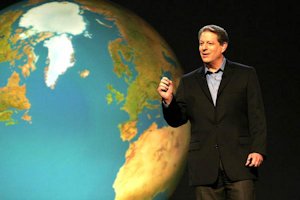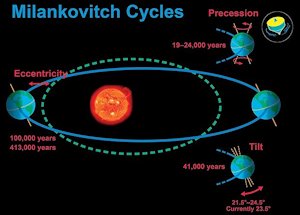Rethinking AGW, Part 9: Loose Ends
 | | Al Gore wins the prize for most mentions in this entire blog series |
One of the most compelling parts of Al Gore's An Inconvenient Truth is when Gore uses ice core samples to demonstrate that CO2 levels correlate extremely well with temperature throughout climatological history, which he strongly implies means that CO2 levels cause climate change. However, when I became aware of the fact that CO2 levels lag behind temperature changes--in other words, CO2 levels only rise after the climate shifts--it seemed to me to be the most damning evidence against global warming alarmism. If this most basic premise of the AGW narrative is false, why do people persist in defining manmade climate change as an indisputable scientific fact?
Indeed, this is hardly the only example of the Academy-winning documentary getting it wrong, and every skeptic, denialist, and dedicated partisan has their favorite factoid that they trot out whenever the subject comes up. Some like to talk about the sun's influence, the thickening of Antarctic ice sheets, the CO2 spewing potential of volcanoes, or that global temperature hasn't gone up since 1998, but almost every one of these arguments is either missing a fair amount of nuance or is outright untrue. This is where websites like Skeptical Science come in handy, because they deal with these specific arguments--dare I call them talking points--one by one. I've already covered many of these points, including the charges that volcanoes are more important than manmade CO2 and that temperatures haven't gone up recently, both of which are unlikely to be true, but there are several others I have yet to confront.
 | | I always thought this bastard was suspect |
Let's start with the most common one, that solar activity is a better predictor of climate than CO2 levels. If you look back into the climatological record, this is absolutely true. While CO2 does correlate fairly well with global temperature, the correlation between solar activity and global temperature is even stronger. There are many, many factors that contribute to the state of climate, but by far the most important, at least in regards to global temperature, is the sun. Thanks to multiple fluctuations in the Earth's orbit, axis, precession, etc., the amount of solar radiation hitting it fluctuates in a fairly predictable way, creating what are known as the Milankovitch Cycles. The Earth's ice ages (glaciations) and warm spikes (interglacials) come and go at roughly 100,000 year rotations, and this regularity is so predictable that any influence of CO2 is negligable when compared to the sun (and, as already mentioned, CO2 changes follow temperature changes, whereas solar irradiance has a nearly simultaneous connection).
However, this deep correlation does not appear to have been true for the last 35 years. Most of the literature has concluded that solar irradiance has seen a slight cooling trend since the mid-to-late 60s. Therefore, if global temperatures have been rising since the mid-to-late 60s, solar irradiance cannot be the primary cause. While the sun is no doubt critical to understanding our climatological history, it cannot explain away any current global warming. If the sun were the only relevant factor in determining our global temperature, our recent climate would have been remarkably stable with a slight downward trend.
 | | Another important climate question: does the ice make our global ass look big? |
Another common argument is the notion that, while Arctic ice is shrinking, the Antarctic ice sheet is thickening. This is something that is only true on the most superficial levels, and anyone who understands the data would have to deliberately misrepresent them in order to make this point. It is, of course, true that the Arctic ice sheet is shrinking, if you take the average of its minimum and maximum throughout each year. It is also true that, if you take the average of its minimum and maximum the same way, the Antarctic sea is seeing an increase in ice.
The missing factor in this equation is the Antarctic land ice, which appears to be in the same steep decline as Arctic ice. Indeed, it is speculated that the increase in sea ice is a result of the constant run-off of melting land ice. It is also important to note that, due to the nature of the Earth's orbit, the Arctic ice sheet is far more important in determining global climate. Any dramatic change in the amount of ice reflecting the solar irradiance in the North could easily create a chain reaction; if there is more ice and thus more solar reflection, the entire Earth would cool, and if there is less ice and thus less solar reflection, the entire Earth would warm. Climatological history is full of examples of both effects, though historical changes were, naturally, not sparked by human CO2 emissions.
There are plenty of other skeptical arguments, but they increase in absurdity and incredibility from this point on. I have no interest in debunking things like global warming on Mars, how the second law of thermodynamics doesn't allow for global warming, or that it's all caused by soot in the atmosphere. Sufficed to say, if these are the arguments convincing you, take some time to do some careful research with an open mind.
 | | Behold the historic cause of climate change |
But what about the argument that convinced me, that CO2 changes follow temperature changes? Here's the thing: it's true, but misleading. Historically, when the Earth started to heat up or cool down as a result of the Milankovitch Cycles, the amount of CO2 locked in the ocean changed. As the Earth heated up, CO2 left the oceans and entered the atmosphere, where its greenhouse potential exacerbated the warming (or visa versa). In such historical examples, CO2 is a secondary causal factor and not the most important one, but it doesn't change the fact that CO2 is a greenhouse gas that could, if its concentration increases in the atmosphere by some extrasolar means, be a primary causal factor in future climate shifts. The entire argument, in other words, is an irrelevant distraction, perpetrated in large part as a direct consequence of Gore's false implications.
Make no mistakes: the other side, as exemplified by An Inconvenient Truth, has its own share of misleading talking points--for instance, alarmists continue to bemoan the fate of polar bears despite evidence that polar bear populations are on the rise--but it seems that the people on the denialist end of the spectrum are more desperate to find quick sound bytes that sound convincing, even if the details are discommoding. At the end of the day, I do believe the full, nuanced truth will win out, but it takes an infuriatingly long time to sift through all the misconceptions and misinformation.
And with that, I've reached the end of this long journey. I walk away believing that AGW is a reality, that manmade CO2 emissions are having an effect on global climate, and that many of the surface arguments against it are lacking. However, I am more convinced than ever that the evidence is nowhere near as extraordinary as the alarmists would have us believe, that publication bias and political influence have caused irrevocable harm to public confidence in the data, and that there is absolutely no such thing as "unbiased." I do not put much stock in any single study or in the conclusions of the IPCC, nor am I swayed by the potential severity of the problem weighed against the potential consequences of dramatic action. I do not believe it is foolish to discuss the problem or propose solutions, but I also do not believe it is helpful for politicians and advocates to denounce skeptics as ignorant ostriches while proclaiming that the debate is over. If there is one thing we should all approach with scientific caution, it is cocksure certitude, especially when the subject matter is as deeply politicized and polarizing as AGW.
-e. magill 7/11/2012
|
|